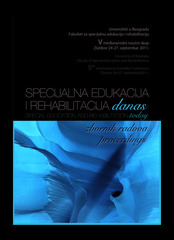Приказ основних података о документу
Uloga porodice u razvijanju prosocijalnog ponašanja dece sa intelektualnom ometenošću
The role of family in the development of prosocial behavior in children with intellectual disability
| dc.contributor | Glumbić Nenad | |
| dc.contributor | Vučinić Vesna | |
| dc.creator | Jelić, Marija | |
| dc.date.accessioned | 2021-06-17T12:48:05Z | |
| dc.date.available | 2021-06-17T12:48:05Z | |
| dc.date.issued | 2011 | |
| dc.identifier.isbn | 978-86-6203-029-0 | |
| dc.identifier.uri | http://rfasper.fasper.bg.ac.rs/handle/123456789/1924 | |
| dc.description.abstract | U radu se razmatra uloga porodice u razvijanju prosocijalnog ponašanja dece sa intelektualanom ometenošću. Pažnja je posvećena problemu definisanja i operacionalizacije prosocijalnog ponašanja. Razmatraju se i načini na koje roditelji mogu doprineti razvoju prosocijalnog ponašanja dece kroz pregled istraživanja čiji rezultati ukazuju na postojanje povezanosti prosocijalnog ponašanja dece sa intelektualnom ometenošću sa odnosima u porodici i funkcionisanjem deteta u njoj. Smatra se da izmeu uticaja roditelja i prosocijalnog ponašanja dece sa intelektualnom ometenošću postoji recipročan odnos. Cilj ovog rada je da ukaže na značaj pozitivnih odnosa u porodici, posebno emocionalne razmene, u razvijanju prosocijalnog ponašanja dece sa intelektualnom ometenošću. | |
| dc.description.abstract | The paper considers the role of family in the development of prosocial behavior of children with intellectual disability. Attention first focuses on the issue of prosocial behavior defining and making it operational. Next consideration is given to the ways that parents may influence a child's prosocial behavioropting on a review of the research findings whose results indicate that there exists correlation between prosocial behavior of children with intellectual disability and particular variables of the relationship processes that characterize the family system. It is thought that between the influence of the parents and prosocial behavior of children with intellectual disability there is mutual relationship. The aim of the paper is to highlight the importance of positive aspects of the family environment, particularly affective expression and relationship quality, in the development of prosocial behavior in children with intellectual disability. | |
| dc.language | sr | |
| dc.rights | openAccess | |
| dc.rights.uri | https://creativecommons.org/licenses/by-sa/4.0/ | |
| dc.source | Zbornik radova - 5. Međunarodni naučni skup „Specijalna edukacija i rehabilitacija danas“, Zlatibor, 24-27. septembar 2011 | |
| dc.subject | prosocijalno ponašanje | |
| dc.subject | deca sa intelektualnom ometenošću | |
| dc.subject | roditelji | |
| dc.subject | porodični odnosi | |
| dc.subject | prosocial behavior | |
| dc.subject | children with intellectual disability | |
| dc.subject | parents | |
| dc.subject | family relationship | |
| dc.title | Uloga porodice u razvijanju prosocijalnog ponašanja dece sa intelektualnom ometenošću | sr |
| dc.title | The role of family in the development of prosocial behavior in children with intellectual disability | |
| dc.type | conferenceObject | |
| dc.rights.license | BY-SA | |
| dc.citation.epage | 281 | |
| dc.citation.other | : 274-281 | |
| dc.citation.spage | 274 | |
| dc.identifier.fulltext | http://rfasper.fasper.bg.ac.rs/bitstream/id/7329/Untitled35.pdf | |
| dc.identifier.rcub | https://hdl.handle.net/21.15107/rcub_rfasper_1924 | |
| dc.type.version | publishedVersion |


